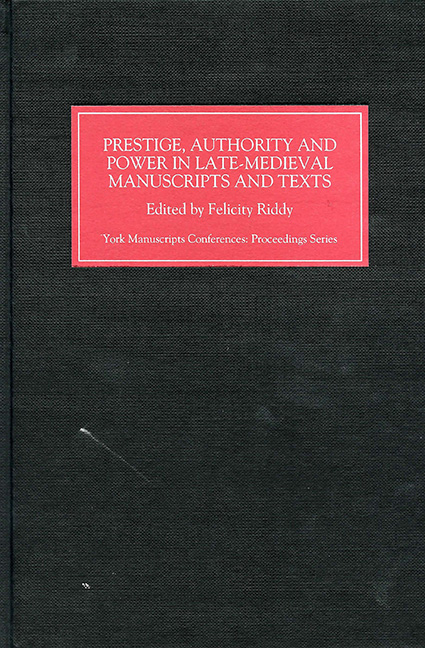Book contents
- Frontmatter
- Contents
- List of Plates
- Introduction
- Inventing Authority: Glossing, Literacy and the Classical Text
- Manuscripts of Nicholas Love's The Mirror of the Blessed Life of Jesus Christ and Wycliffite Notions of ‘Authority’
- The Patronage and Dating of Longleat House MS 24, a Prestige Copy of the Pupilla Oculi Illuminated by the Master of the Troilus Frontispiece
- Limner-Power: A Book Artist in England c. 1420
- A Poet's Contacts with the Great and the Good: Further Consideration of Thomas Hoccleve's Texts and Manuscripts
- The Politics of Book Ownership: The Hopton Family and Bodleian Library, Digby MS 185
- Piety, Politics and Persona: MS Harley MS 4012 and Anne Harling
- The Abbess of Malling's Gift Manuscript (1520)
- ‘Plutarch's’ Life of Agesilaus: A Recently Located New Year's Gift to Thomas Cromwell by Henry Parker, Lord Morley
- Manuscripts after Printing: Affinity, Dissent and Display in the Texts of Wyatt's Psalms
- Index of manuscripts
- Index of names and titles
- York Medieval Press: Publications
The Abbess of Malling's Gift Manuscript (1520)
Published online by Cambridge University Press: 24 October 2017
- Frontmatter
- Contents
- List of Plates
- Introduction
- Inventing Authority: Glossing, Literacy and the Classical Text
- Manuscripts of Nicholas Love's The Mirror of the Blessed Life of Jesus Christ and Wycliffite Notions of ‘Authority’
- The Patronage and Dating of Longleat House MS 24, a Prestige Copy of the Pupilla Oculi Illuminated by the Master of the Troilus Frontispiece
- Limner-Power: A Book Artist in England c. 1420
- A Poet's Contacts with the Great and the Good: Further Consideration of Thomas Hoccleve's Texts and Manuscripts
- The Politics of Book Ownership: The Hopton Family and Bodleian Library, Digby MS 185
- Piety, Politics and Persona: MS Harley MS 4012 and Anne Harling
- The Abbess of Malling's Gift Manuscript (1520)
- ‘Plutarch's’ Life of Agesilaus: A Recently Located New Year's Gift to Thomas Cromwell by Henry Parker, Lord Morley
- Manuscripts after Printing: Affinity, Dissent and Display in the Texts of Wyatt's Psalms
- Index of manuscripts
- Index of names and titles
- York Medieval Press: Publications
Summary
In 1520 the abbess of Malling, Kent, gave a Sarum book of hours (now Blackburn Museum and Art Gallery, MS 21040) to her godchild, the infant Margaret Neville, at her christening. A collection of notes in the book's calendar, discovered and published by F. J. Furnivall, gives a remarkably complete outline of Margaret Neville's subsequent life. The annotations record the death of her mother when she was seven; her marriage to Sir Robert Southwell at age sixteen; the births of her five children; the death, first of her father, Sir Thomas Neville, and then of her husband; and finally her second marriage to William Plumbe. Her death and Plumbe's remarriage complete this series of events, which spans the years from 1520 to 1579.
The unusually comprehensive nature of this family record, centred as it is on the life of a single woman, and contained in the gift book that she received from another woman, might suggest that this book falls into a familiar category: a token of affectionate regard whose status as a family heirloom owes much to personal feeling. Ex dono inscriptions in books most often affirm ties either of blood or of affection, or they gesture toward a community of interest in which reading plays a central role.
Much rarer are exchanges of books that reveal a relationship of power. Yet in the abbess's gift such pressures are perceptible. Here the reality of self-interest is disguised by the festive and occasional nature of this gift; disguised also by the passage of the book between two women; and finally, hidden by the tropes of helplessness which these particular women, a nun and an infant, embody. Nevertheless the abbess's gift constitutes an element in the struggle for power between monastic houses and local magnates, a struggle particularly intense in early sixteenth-century Kent. In the manuscript's ownership history, it is often clear that relations of kinship and friendship underlie its movement from hand to hand. Simultaneously, the sterner obligations produced by the realities of political power can be discerned as well. Hence the book's markings might be seen as representing both horizontal lines of force – the ties of affectionate regard – and vertical ones – the bonds of patronage and clientage.
- Type
- Chapter
- Information
- Publisher: Boydell & BrewerPrint publication year: 2000



